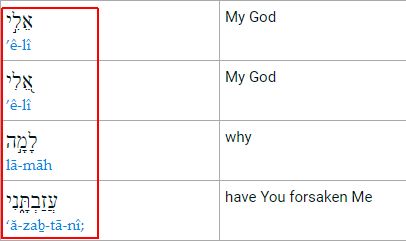
“And about the ninth hour Jesus cried out with a loud voice, saying, “Eli, Eli, lema sabachthani?” that is, “My God, my God, why have you forsaken me?”
Matthew 27:46
Muslims love to use this verse as a proof-text to deny the deity of Jesus because this verse apparently shows Jesus pleading with God for forsaking him. Since Jesus is pleading with God, then Jesus can’t be God. That’s the Muslim argument.
First of all, let me show you that Jesus was not even addressing the Father when He said these words.
Jesus was quoting words of the scripture in Psalm 22.

In fact, as you can see above, Jesus was quoting WORD-FOR-WORD (highlighted in red) from Psalm 22:1.
Muslims fail to realize this.
Who was Jesus addressing? He was addressing the people! He was directing and pointing them to Psalm 22.
The writers of the gospel understood this and even made sure that this phrase was kept in Hebrew. Anyone with some familiarity with Hebrew scriptures would have immediately caught that Jesus was referencing Psalm 22.
Yet, just as Muslims misunderstand those words today, some Jews at that time, also misunderstood the words. In fact, the passage tells that some of the Jews there thought that Jesus was addressing the Prophet Elijah! (cf Matthew 27:47)
Jesus was not speaking to Elijah. Neither was He speaking to the Father. He was crying out the words of Psalm 22:1 speaking for all the people there to hear.
[I have seen some Muslims, not so proficient in English, ask, “Why was Jesus crying?” “Crying out” means ‘to shout, or to say something loudly’. I have also heard some Muslims argue that Jesus was crying in pain and agony and had lost his mind and become incoherent when he said these words. That is not true at all. Jesus was on the cross for 6 hours and it’s true he was under tremendous excruciating pain, but he was clear in everything He spoke. The Gospel records for us 7 statements He made while on the cross. ]
The obvious question would be, “So why was Jesus speaking the words of Psalm 22 while He was on the cross?” What’s the meaning? What’s the significance?
Psalm 22 was a 1000-year-old psalm written by David, describing his persecution but the graphic detail David includes was more than just his own story. It was a prophecy of the future Messiah. When Jesus pointed out this Psalm, it was analogous to someone saying, “Remember Psalm 22?” The apostles eventually made the connections.
Psalm 22 foreshadowed the crucifixion of Christ:
i. In Psalm 22:7, it speaks of a man surrounded by others who scorn and despise him. This is what happened to Jesus in Matthew 27:39 and Mark 15:29.
ii. In Psalm 22:7, it speaks of a man being mocked, which is similar in the descriptions of Jesus’ crucifixion given in Matthew 27:31, Mark 15:20 and Luke 22:63; 23:36.
iii. In Psalm 22:8, it says, “He trusts in the LORD; let the LORD rescue him. Let him deliver him, since he delights in him.” In Matthew 27:43, Jesus’ enemies taunted him by saying, “He trusts in God. Let God rescue him now if he wants him.”
iv. In Psalm 22:16, it speaks of a man who was numbered with the transgressors, meaning an innocent man being regarded as being one of a group of criminals. Jesus too was numbered with the transgressors when he was crucified next to two criminals, as described in Matthew 27:38, Mark 15:27, Luke 23:32 and John 19:18.
v. In Psalm 22:16, it speaks of a man whose hands and feet are either pierced, or mauled, or disfigured, depending on which is truly the best English translation of the original verse. In John 19:23,34,37 – Jesus’ hands and feet were pierced with nails during the crucifixion process.
vi. In Psalm 22:17, it speaks of a man who would be surrounded by others who stared and gloated at him. This too was the situation for Jesus during the crucifixion, according to Matthew 27:36 and Luke 23:35.
vii. In Psalm 22:18, onlookers gamble for pieces of clothing that belonged to the person being persecuted. As explained in Matthew 27:35, Roman soldiers gambled (cast lots) for articles of Jesus’ clothing while he was being crucified.
There are other descriptions in Psalm 22 that sound like an accurate description of what would happen to a person being crucified, such as the disjointing of bones, the drying up of a person’s strength, an intense sense of thirst, a heart melting like wax (Jesus was stabbed in the side with a spear during his crucifixion), and being “poured out” of one’s body. When Jesus was stabbed, blood and water poured out from the wound.
“These sufferings (of Psalm 22) transcend those of any historical sufferer with the single exception of Jesus Christ. They find their exact counterpart in the sufferings of the cross…this ideal is a Messianic ideal, and finds its only historical realization in Jesus Christ.”
Professor Charles Briggs, Union Theological Seminary
(the above excerpt is from Ray Konig’s book, 100 Fulfilled Bible Prophecies.)
But there is much more than that. I believe there is something very significant in John 27:45, “From the sixth hour until the ninth hour darkness came over all the land.” i.e. from around 12 noon to 3 pm. We don’t know what happened, but it was clearly something supernatural, possibly a total eclipse of the sun that blocked out the light of the sun for 3 hours.
In the Bible, darkness was often symbolic of judgment. There is a remarkable parallel in the Torah in Exodus. The penultimate (9th) plague was the Plague of Darkness, which covered Egypt for 3 days. It was not just judgment on Egypt but was also the precursor to something more unimaginable and tragic. Just as the 3 days of darkness in Egypt was a sign of impending doom, the 3 hours of darkness at Calvary led to death.
The tenth and final plague was the death of every firstborn in every household of Egypt beginning from the Pharoah’s firstborn. This tragedy was what finally broke Pharoah and compelled him to let the Israelites go. Judgment and punishment had come on Egypt. (Interestingly and curiously, the Quran completely fails to record all the plagues correctly, let alone the correct number of plagues.)
Following the three days of darkness in Egypt, was DEATH. Every family was affected.
Every firstborn son in Egypt will die, from the firstborn son of Pharaoh, who sits on the throne, to the firstborn son of the female slave, who is at her hand mill….
Exodus 11:5
However, among the Israelites, something else happened. Yes, there was death in their family. But it was the death of a lamb!
Tell the whole community of Israel that on the tenth day of this month each man is to take a lamb for his family…slaughter them at twilight. Then they are to take some of the blood and put it on the sides and tops of the doorframes of the houses…. I will pass through Egypt and strike down every firstborn of both people and animals, and I will bring judgment on all the gods of Egypt. I am the Lord. The blood will be a sign for you on the houses where you are, and when I see the blood, I will pass over you. No destructive plague will touch you when I strike Egypt.
Exodus 12:3-13
I see a remarkable parallel.
Three days of darkness in Egypt led to the substitutionary atoning death of the lamb for the Israelites.
While the three hours of darkness at Calvary led to the substitutionary atoning death of the Lamb for all man.
Which camp do you want to be in?
The camp of the Egyptians? Or the camp of the Israelites whose trust in the blood of the lamb brought them salvation, while the Egyptians perished.
The next day John saw Jesus coming toward him and said, “Look, the Lamb of God, who takes away the sin of the world! John 1:29
For even the Son of Man did not come to be served, but to serve, and to give His life as a ransom for many.
Mark 10:45
This is my blood of the covenant, which is poured out for many for the forgiveness of sins. Matthew 26:28
Then he opened their minds so they could understand the Scriptures. He told them, “This is what is written: The Messiah will suffer and rise from the dead on the third day, and repentance for the forgiveness of sins will be preached in his name to all nations, beginning at Jerusalem. Luke 24:45-47
For you know that it was not with perishable things such as silver or gold that you were redeemed from the empty way of life you inherited from your forefathers, but with the precious blood of Christ, a lamb without blemish or spot. He was known before the foundation of the world, but was revealed in the last times for your sake.
1 Peter 1:18-20
How about the “ka-ari” (mis)translation?
Nonetheless, Jesus is still considered to be a false Messiah given the requirements.
Carl,
You said Jesus is considered to be a false Messiah, given the requirements.
1. What requirements?
2. Who considers Jesus to be false Messiah? Christians or Muslims?
3. Please tell us the significance of Messiah according to Islam.
He should even tell us what duty was al Masia supposed to take up. What is the meaning of Al Masia as used by Quran.
It won’t be funny if the person you responded to is a student of Tovia Singer.
Good job to you for the write up
Tovia is a Jew, ergo, his beliefs in the Messiah may not be accurate according to the Bible. and you need to read more of admin’s articles about the Messiah if you don’t understand why a) Jesus (Yeshua) said He truly was the Messiah and b) why just saying He is the Messiah flat out wouldn’t work.